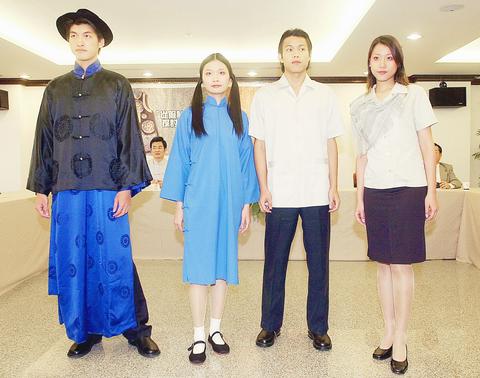As the government ponders whether to design a new national dress for Taiwan, scholars and fashion experts said yesterday that it is crucial that such an outfit be comfortable and modern -- and have a distinctly Taiwanese identity.
They made the remarks at a seminar hosted by the Ministry of the Interior yesterday for scholars, fashion experts and legislators to exchange opinions on whether there exists a need for designing a new national dress and what would be the appropriate style for such costume.

PHOTO: FANG PIN-CHIAO, TAIPEI TIMES
At the seminar hosted by Minister of the Interior Yu Cheng-hsien (余政憲), those in attendence also said that the Uniform and Dressing Regulation (服制條例), established 73 years ago, should be either amended or abolished, although no suggestions as to the content of an amended law were submitted.
The 1929 law states that government officials must wear national dress on formal occasions and when meeting foreign dignitaries, but this law has not been observed in decades.
In his opening speech to the seminar, Yu said that unlike many other countries such as Japan, Thailand and Korea, Taiwan does not have a national dress that reflects its image and spirit.
According to the Uniform and Dressing Regulation, Taiwan's national dress is the Manchurian-style long gown, and the civil servants' uniforms are "Chung-shan suits" (
"Since these old dress styles no longer suit modern society, the regulation must either be amended or abolished," Yu said.
"The ministry would like to gather expert opinions in the search for a beautiful form of dress for the Taiwanese people," said Yu.
According to the ministry, the new national dress should be formal wear designed for representing Taiwan on international occasions, similar to the kimono of Japan and the Indian sari.
Hu Tze-ming (胡澤民), a professor at Fujen Catholic University said that, although Western-style suits and ties are indispensable in modern society, it is crucial that Taiwan has a national dress that suits its subtropical climate and projects its distinctive image.
To win the acceptance of the general public, Hu suggested that strict rules should not govern the design of Taiwan's national dress but crucial elements that need to be included in the design should be clearly identified.
Lo Mai-ruei (羅麥瑞), another professor, said that since dress is a "power language" and is closely linked to a nation's history and culture, it is important for the Tai-wanese people to find out their cultural identity and blend it into the design of the national dress.
"The idea of multi-ethnic culture and the natural beauty of Formosa are all valuable sources in searching for the basic elements for the national dress," Lo said.
Huang Tsai-lang (黃才郎), director of Taipei Fine Art Museum, suggested that the creation of such a national dress should involve a gradual progress of accumulating thoughts and ideas from as many sources as possible in order to avoid controversy.
"However, the national dress should be comfortable, distinctive and elegant, and respect international social etiquette," said Huang.
* According to the Uniform and Dressing Regulation, Taiwan's national dress is the Manchurian-style long gown.
* The civil servants' uniforms are supposed to be `Chung-shan suits' for men and `chi-pao suits' for women.

The inspection equipment and data transmission system for new robotic dogs that Taipei is planning to use for sidewalk patrols were developed by a Taiwanese company, the city’s New Construction Office said today, dismissing concerns that the China-made robots could pose a security risk. The city is bringing in smart robotic dogs to help with sidewalk inspections, Taipei Deputy Mayor Lee Ssu-chuan (李四川) said on Facebook. Equipped with a panoramic surveillance system, the robots would be able to automatically flag problems and easily navigate narrow sidewalks, making inspections faster and more accurate, Lee said. By collecting more accurate data, they would help Taipei

TAKING STOCK: The USMC is rebuilding a once-abandoned airfield in Palau to support large-scale ground operations as China’s missile range grows, Naval News reported The US Marine Corps (USMC) is considering new sites for stockpiling equipment in the West Pacific to harden military supply chains and enhance mobility across the Indo-Pacific region, US-based Naval News reported on Saturday. The proposed sites in Palau — one of Taiwan’s diplomatic allies — and Australia would enable a “rapid standup of stored equipment within a year” of the program’s approval, the report said, citing documents published by the USMC last month. In Palau, the service is rebuilding a formerly abandoned World War II-era airfield and establishing ancillary structures to support large-scale ground operations “as China’s missile range and magazine

A 72-year-old man in Kaohsiung was sentenced to 40 days in jail after he was found having sex with a 67-year-old woman under a slide in a public park on Sunday afternoon. At 3pm on Sunday, a mother surnamed Liang (梁) was with her child at a neighborhood park when they found the man, surnamed Tsai (蔡), and woman, surnamed Huang (黃), underneath the slide. Liang took her child away from the scene, took photographs of the two and called the police, who arrived and arrested the couple. During questioning, Tsai told police that he had met Huang that day and offered to

BETTER SERVICE QUALITY: From Nov. 10, tickets with reserved seats would only be valid for the date, train and route specified on the ticket, THSRC said Starting on Nov. 10, high-speed rail passengers with reserved seats would be required to exchange their tickets to board an earlier train. Passengers with reserved seats on a specific train are currently allowed to board earlier trains on the same day and sit in non-reserved cars, but as this is happening increasingly often, and affecting quality of travel and ticket sales, Taiwan High-Speed Rail Corp (THSRC) announced that it would be canceling the policy on Nov. 10. It is one of several new measures launched by THSRC chairman Shih Che (史哲) to improve the quality of service, it said. The company also said